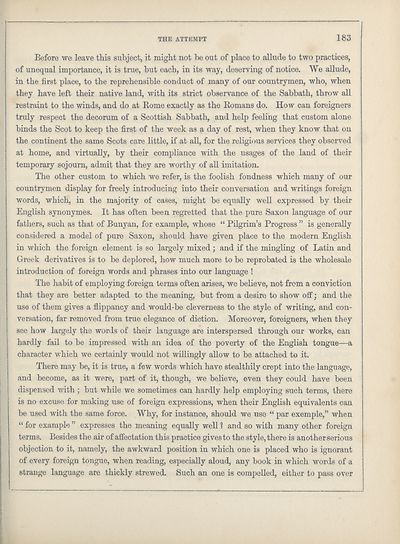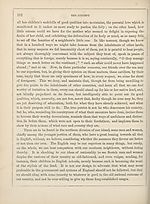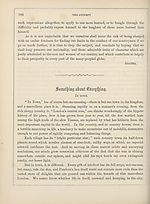Attempt > Volume 1 and Select writings
(195) Page 183
Download files
Complete book:
Individual page:
Thumbnail gallery: Grid view | List view

THE ATTEMPT
183
Before we leave this subject, it might not be out of place to allude to two practices,
of unequal importance, it is true, but each, in its way, deserving of notice. We allude,
in the first place, to the reprehensible conduct of many of our countrymen, who, when
they have left their native land, with its strict observance of the Sabbath, throw all
restraint to the winds, and do at Rome exactly as the Romans do. How can foreigners
truly respect the decorum of a Scottish Sabbath, and help feeling that custom alone
binds the Scot to keep the first of the week as a day of rest, when they know that on
the continent the same Scots care little, if at all, for the religious services they observed
at home, and virtually, by their compliance with the usages of the land of their
temporary sojourn, admit that they are worthy of all imitation.
The other custom to which we refer, is the foolish fondness which many of our
countrymen display for freely introducing into their conversation and writings foreign
words, which, in the majority of cases, might be equally well expressed by their
English synonymes. It has often been regretted that the pure Saxon language of our
fathers, such as that of Bunyan, for example, whose “ Pilgrim’s Progress ” is generally
considered a model of pure Saxon, should have given place to the modern English
in which the foreign element is so largely mixed ; and if the mingling of Latin and
Greek derivatives is to be deplored, how much more to be reprobated is the wholesale
introduction of foreign words and phrases into our language !
The habit of employing foreign terms often arises, we believe, not from a conviction
that they are better adapted to the meaning, but from a desire to show off; and the
use of them gives a flippancy and would-be cleverness to the style of writing, and con¬
versation, far removed from true elegance of diction. Moreover, foreigners, when they
see how largely the words of their language are interspersed through our works, can
hardly fail to be impressed with an idea of the poverty of the English tongue—a
character which we certainly would not willingly allow to be attached to it.
There may be, it is true, a few words which have stealthily crept into the language,
and become, as it were, part of it, though, we believe, even they could have been
dispensed with ; but while we sometimes can hardly help employing such terms, there
is no excuse for making use of foreign expressions, when their English equivalents can
be used with the same force. Why, for instance, should we use “ par exemple,” when
“ for example ” expresses the meaning equally well 1 and so with many other foreign
terms. Besides the air of affectation this practice gives to the style, there is another serious
objection to it, namely, the awkward position in which one is placed who is ignorant
of every foreign tongue, when reading, especially aloud, any book in which words of a
strange language are thickly strewed. Such an one is compelled, either to pass over
183
Before we leave this subject, it might not be out of place to allude to two practices,
of unequal importance, it is true, but each, in its way, deserving of notice. We allude,
in the first place, to the reprehensible conduct of many of our countrymen, who, when
they have left their native land, with its strict observance of the Sabbath, throw all
restraint to the winds, and do at Rome exactly as the Romans do. How can foreigners
truly respect the decorum of a Scottish Sabbath, and help feeling that custom alone
binds the Scot to keep the first of the week as a day of rest, when they know that on
the continent the same Scots care little, if at all, for the religious services they observed
at home, and virtually, by their compliance with the usages of the land of their
temporary sojourn, admit that they are worthy of all imitation.
The other custom to which we refer, is the foolish fondness which many of our
countrymen display for freely introducing into their conversation and writings foreign
words, which, in the majority of cases, might be equally well expressed by their
English synonymes. It has often been regretted that the pure Saxon language of our
fathers, such as that of Bunyan, for example, whose “ Pilgrim’s Progress ” is generally
considered a model of pure Saxon, should have given place to the modern English
in which the foreign element is so largely mixed ; and if the mingling of Latin and
Greek derivatives is to be deplored, how much more to be reprobated is the wholesale
introduction of foreign words and phrases into our language !
The habit of employing foreign terms often arises, we believe, not from a conviction
that they are better adapted to the meaning, but from a desire to show off; and the
use of them gives a flippancy and would-be cleverness to the style of writing, and con¬
versation, far removed from true elegance of diction. Moreover, foreigners, when they
see how largely the words of their language are interspersed through our works, can
hardly fail to be impressed with an idea of the poverty of the English tongue—a
character which we certainly would not willingly allow to be attached to it.
There may be, it is true, a few words which have stealthily crept into the language,
and become, as it were, part of it, though, we believe, even they could have been
dispensed with ; but while we sometimes can hardly help employing such terms, there
is no excuse for making use of foreign expressions, when their English equivalents can
be used with the same force. Why, for instance, should we use “ par exemple,” when
“ for example ” expresses the meaning equally well 1 and so with many other foreign
terms. Besides the air of affectation this practice gives to the style, there is another serious
objection to it, namely, the awkward position in which one is placed who is ignorant
of every foreign tongue, when reading, especially aloud, any book in which words of a
strange language are thickly strewed. Such an one is compelled, either to pass over
Set display mode to: Large image | Transcription
Images and transcriptions on this page, including medium image downloads, may be used under the Creative Commons Attribution 4.0 International Licence unless otherwise stated. ![]()
| Ladies' Edinburgh Debating Society publications > Attempt > Volume 1 and Select writings > (195) Page 183 |
|---|
| Permanent URL | https://digital.nls.uk/109867294 |
|---|
| Attribution and copyright: |
|
|---|

